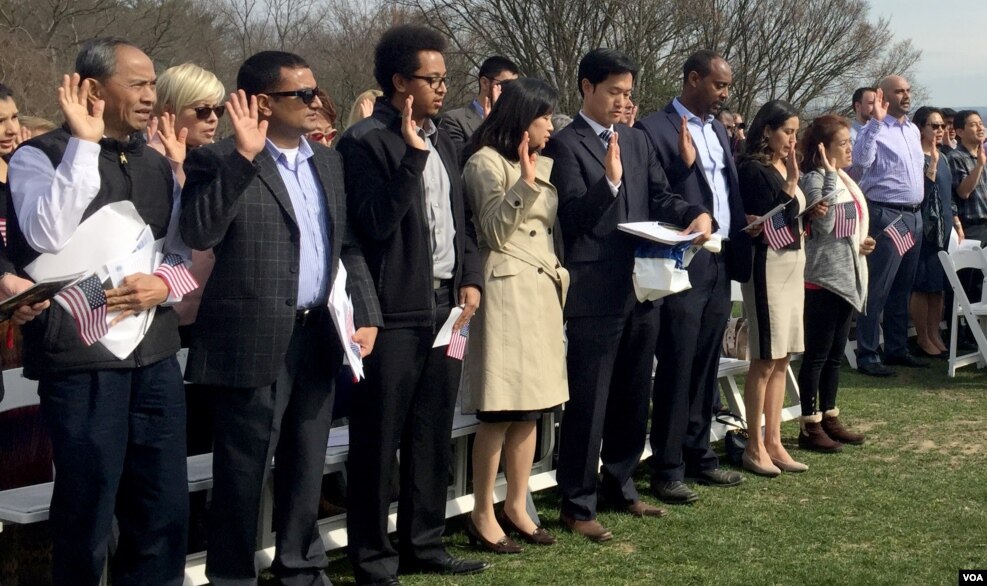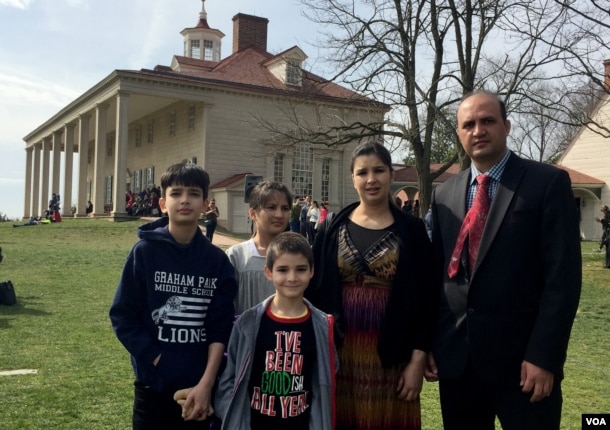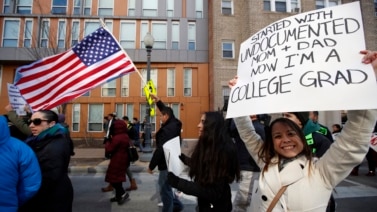
Excitement was in the air and on the grounds of Mount Vernon, home of George Washington, the first president of the United States.
Friends and family gathered there to watch loved ones become U.S. citizens on the 285th anniversary of Washington's birthday.
Fifty one people, from 31 different countries, would now be citizens of one country, the United States of America.
They were continuing the rich American tradition of a nation built by immigrants. But they were taking the oath of citizenship while the country debates President Donald Trump's order to ban people from seven Muslim-majority countries.
Iraq is one of those countries.
Omar Khan was born there. He came to the U.S. as a refugee, fleeing his home in Iraq. He says he is “overwhelmed” and happy to be a U.S. citizen. Now he will be able to travel freely with an American passport.
He says it is unfair to ban people who are Muslim.
“You're creating a culture of hate in the United States, and you know, we're always talking about uniting people of the United States. And then you come out with a speech of hate and discrimination, I don't think that's that is something that this nation is built on.”
He says the travel ban means his mother will not be able to come visit her grandchildren in the U.S. But, Khan adds the Obama administration had denied entry to her before.
“Why would you refuse a sixty years old woman to come here and see her grandkids?”
Bibi Mariam Jamalzai is also against banning Muslims. On Wednesday she became the last person in her family to become a U.S. citizen. As a Muslim from Afghanistan, she says she does “not like” the new travel ban, but she has “a good feeling” about becoming an American citizen.
Standing with their three children, Asmat Jamalzai is happy for his wife. He had helped U.S. forces in Afghanistan and became a U.S. citizen in 2014. He says banning people because of their religion is wrong.
“I think the government should based on the US constitution, it shouldn't ban any one based on their religion. However, I think that the security of the United States is very important, so the government should take some steps to keep Americans safe.”
Jamalzai believes some green card holders are afraid that if they go back to their countries to visit family, they will not be able to get back into the U.S.
“I think this is a big concern for most people who are green card holders. And they have a big American dream, that it's a great country now they see some, some hard stuff that they haven't experienced yet.”

In fact, the Associated Press reported that organizations around the country are seeing an increase in people asking questions about becoming U.S. citizens. Organizations in Los Angeles, Maryland and New York that help immigrants from Latin America, Asia and the Middle East all said they have seen an increase in calls and questions about how to become a citizen.
Adam Cook was born in England. He stood on George Washington's lawn - the home of the man who defeated England to gain U.S. independence-- and along with his fellow new Americans, Cook took the oath of citizenship.
“So help me God. Congratulations my fellow citizens!”
Cook says he wants to help his new country be better.
He also opposes the travel ban.
“I don't think that it will be effective. I think that we need to make sure that we treat everyone equal. Everyone was immigrant to begin, and everyone will be coming forward and that's what makes this a great country and sets the tone for a lot of other countries."
Cook points to the many nations represented at the ceremony and says that diversity is “everything about what America is.” He says Americans need to work together “because if we are going to keep… thinking about the bad in people, we're never going to find the good” in people.
The people were given certificates of citizenship and encouraged to register to vote right away.
As the music started playing again, the new Americans found their families and friends, and left to start new lives as U.S. citizens.
I'm Anne Ball.
Anne Ball reported and wrote this story for Learning English. Hai Do was the editor.
We want to hear from you. Write to us in the Comments Section and find us on Facebook.
Words in This Story
overwhelmed - adj. overcome with emotion
discrimination - n. the practice of unfairly treating a person or group of people differently from other people or groups of people
refuse - v. to not allow someone to have (something)
green card - n. a card indicating that a person from a foreign country can live and work in the U.S.
diversity - n. the quality or state of having many different forms, types, ideas, etc.
lawn - n. an area of ground covered with short grass


